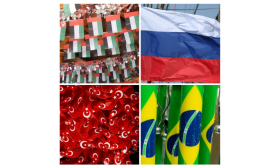middle east
What Jimmy Carter began, Barack Obama is ending. Washington is bringing down the curtain on its 30-plus-year military effort to pull the Islamic world into conformity with American interests and expectations. It’s about time. Back in 1980, when his promulgation of the Carter Doctrine launched that effort, Carter acted with only a vague understanding of what might follow.
The Geneva Agreement is a setback for Israeli diplomacy and a personal defeat for Israeli Prime Minister Benjamin Netanyahu. As the United States and its other allies have sought to respond to what they see as signs of change in Tehran, Mr Netanyahu has stuck grimly to the same message. That is that those signs may be cosmetic and that the world powers are relaxing sanctions without getting much in return.

**UPDATE: On November 27, the BIE announced that the United Arab Emirates has been elected as the host country of the World Expo 2020**
Over the last week or so, there have been more than a few stinging indictments of U.S.-Middle East policy. Whether it is Iran’s nuclear program, the civil war in Syria, or Secretary of State John Kerry’s effort to push Israeli-Palestinian peace talks, the Obama administration is near universally derided as both timorous and out-classed in the face of formidable adversaries. It’s been an impressive pile-on even if some of this commentary is actually more about politics than analysis.
The United Arab Emirates isn't a country you'd typically associate with hip-hop. It's a place that is generally bereft of the cultural signifiers native to the dark, dank locales where rap was birthed—Illmatic, for instance, probably wouldn't have been the same album if it was about the struggle of going $40 million over budget on your new artificial archipelago instead of the fight out of inner-city poverty.
Here’s a statistic from an official Pentagon presentation, recently revealed at a security industry conference in Augusta, Georgia. The subject was American military interventions since the end of World War II. The figures: 44 interventions – one a year – between 1945 and 1989; and another 100 – three to four a year – since the end of the Cold War.
Arab women played a central role in the Arab Spring, but their hopes the revolts would bring greater freedom and expanded rights for women have been thwarted by entrenched patriarchal structures and the rise of Islamists, gender experts in the countries say.
Al Qaeda is building its most dangerous stronghold ever in the borderlands between Syria and Iraq. Hundreds of new jihadist fighters are flocking to this battlefield in the heartland of the Middle East. And with the civil wars in both countries all but certain to endure for the foreseeable future, the danger from this stronghold is growing.







